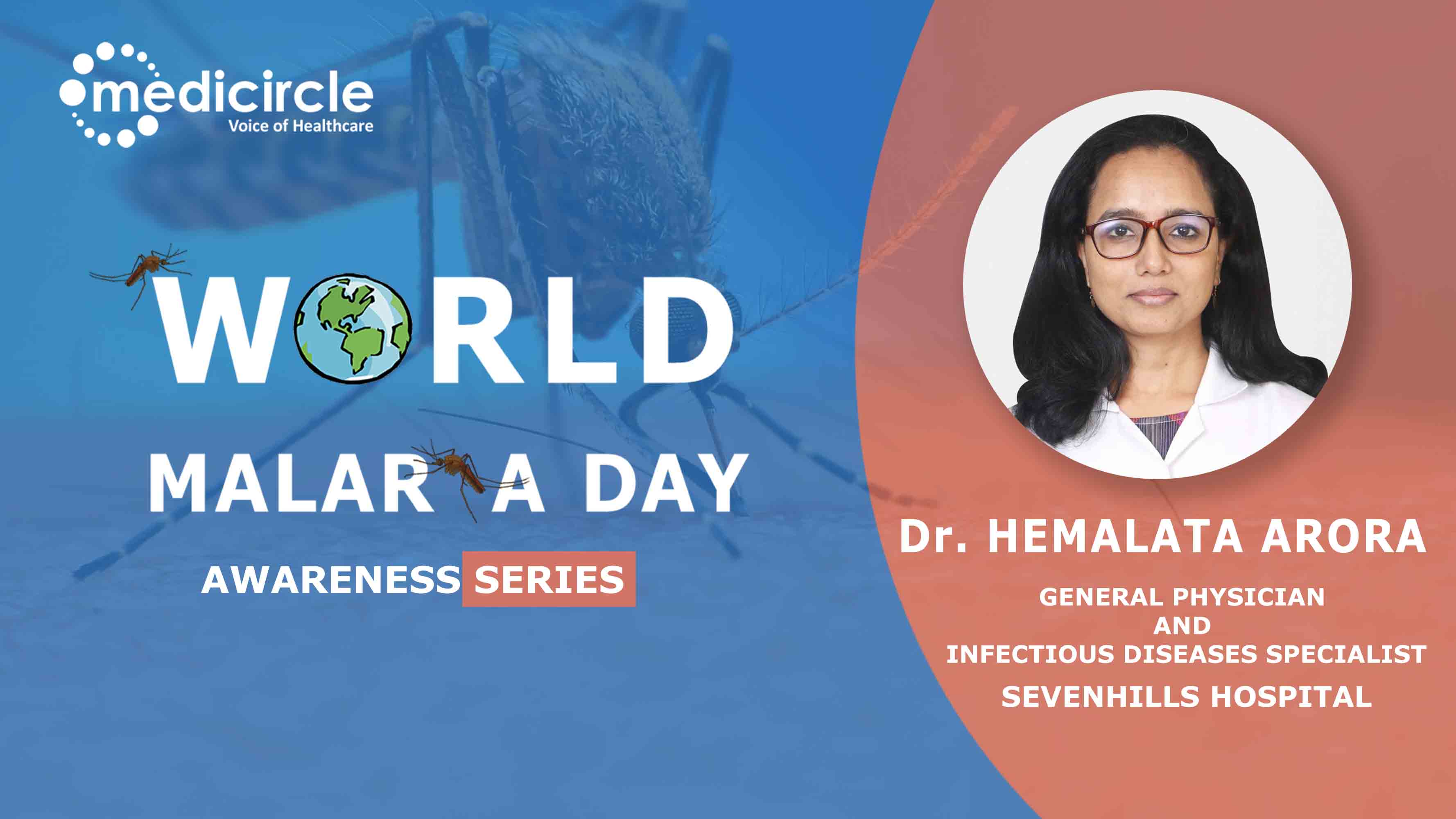World Malaria Day is observed annually on 25th April to bring global attention to the efforts being made to end malaria and bring about a change to eradicate malaria completely. The WHO has noted impressive gains by India in their fight against malaria. According to its report, most malaria prevention campaigns were able to move forward this year without any delays in spite of the COVID19 pandemic. India recorded the largest reduction in malaria cases in Southeast Asia from 2000-2019. India has contributed to the largest drop in cases nationwide from 20 million to 6 million. In Spite of the outstanding achievement by India in cases of Malaria, strict intervention is needed to eradicate it completely from India to zero cases.
At Medicircle, we are conducting a series on Malaria with Eminent Doctors for World Malaria Day to boost awareness and educate people about the preventions from it.
Dr. Hemalata Arora is an Internal Medicine and General Physician in Mumbai. She has experience of 20 years in this field. She practices at Seven Hills Hospital and Nanavati hospital in Mumbai. She is a Diplomat of the National Board of Medicine, India. Moreover, she is also ECFMG certified and accredited by the American Board of Internal Medicine
Cause and types of malaria
Dr. Hemalata Arora says, “Malaria is limited by the bite of a mosquito specifically, female Anopheles mosquito which results in transmission of Plasmodium parasite which causes malaria. Plasmodium gets transmitted when a mosquito bites a human being into the body and causes malaria. There are several kinds of malaria. The types of malaria parasite are as follows:
- Falciparum malaria
- Plasmodium vivax
- Plasmodium malaria II
- Plasmodium ovale which are very rare”
Signs and symptoms of malaria
Dr. Arora explains, “ The signs and symptoms of malaria are as follows
- Fever with chills is the hallmark sign of malaria
- The rise in temperature for 2 -3 days
- Bodyache
- Nausea
- Vomiting
- Bellyache
- Low Hb levels
- Low platelet count
- Bleeding tendencies
- Renal or kidney problems
- Stomach problems
- Liver problems
- Fatigue.”
Prevention of malaria
Dr. Arora states, ”The best way to prevent Malaria is basically to prevent bites from infected mosquitoes. So, an infected female Anopheles mosquito with a particular breed can cause malaria. So, there are various ways of preventing it which are as follows:
- Repellants: Mosquito repellents when you go outside.
- Covered clothes: Long-sleeved and loose pants with covered clothes to avoid mosquitoes bites especially during the evening and night
- Stop breeding of mosquitoes especially in stagnant water which are breeding grounds of mosquitoes
- Genetic model modification of mosquitoes.”
A diagnostic test for malaria is important to find the type of malarial parasite
Dr. Arora informs, “Once somebody is suspected of having malaria, we do a diagnostic test either a peripheral smear or a CBC to check for a malarial parasite. We usually are able to find the malaria parasite quite easily. Sometimes, there are also serological or antigen tests for a malarial antigen which can be done.”
Treatment of malaria
Dr. Arora explains, “Once we find or suspect malaria especially if a person has been outdoors or at construction work, we go ahead and start the anti-malaria treatment, which is usually a course of five days of malaria medicine. In remote parts of India, anti-malaria medicine is usually reasonably produced called chloroquine which is sensitive, but there are some pockets that have chloroquine-resistant malaria. So, the main modality to treat is usually with Artemisinin or its derivatives. Less than 1% of people with malaria need admission to hospitals to get treatment. There are other forms of malarial parasites like the vivax and the falciparum which can lie dormant in the liver and need to be eliminated from the liver as well. This is differentiated by the diagnostic test. Depending on the type of malaria, we can accordingly decide the line of treatment.”
(Edited by Dr.Rati Parwani)

 Dr. Hemalata Arora gives important insights about Malaria and its signs, symptoms, and effective treatment. With her expertise, she gives important tips to prevent Malaria in children.
Dr. Hemalata Arora gives important insights about Malaria and its signs, symptoms, and effective treatment. With her expertise, she gives important tips to prevent Malaria in children. 






.jpeg)


.jpg)









.jpeg)





.jpg)




.png)



